Grand Turk Island
Grand Turk Island is an island in the Turks and Caicos Islands, a British Overseas Territory, tropical islands in the Lucayan Archipelago of the Atlantic Ocean and northern West Indies.[2] It is the largest island in the Turks Islands (the smaller of the two archipelagos that make up the island territory) with 18 km2 (6.9 sq mi). Grand Turk contains the territory's capital, Cockburn Town, and the JAGS McCartney International Airport. The island is the administrative, historic, cultural and financial centre of the territory and has the second-largest population of the islands at approximately 4,831 people in 2012.[1]
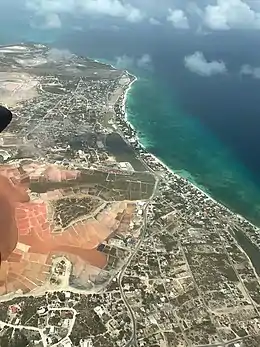 Grand Turk as seen from the air, from midway on the island and looking south. The large reddish area is a remnant salina, a local name for the artificial ponds used to extract salt from sea water through evaporation. | |
 The location of Grand Turk within the Turks and Caicos Islands | |
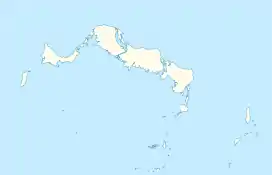 Grand Turk 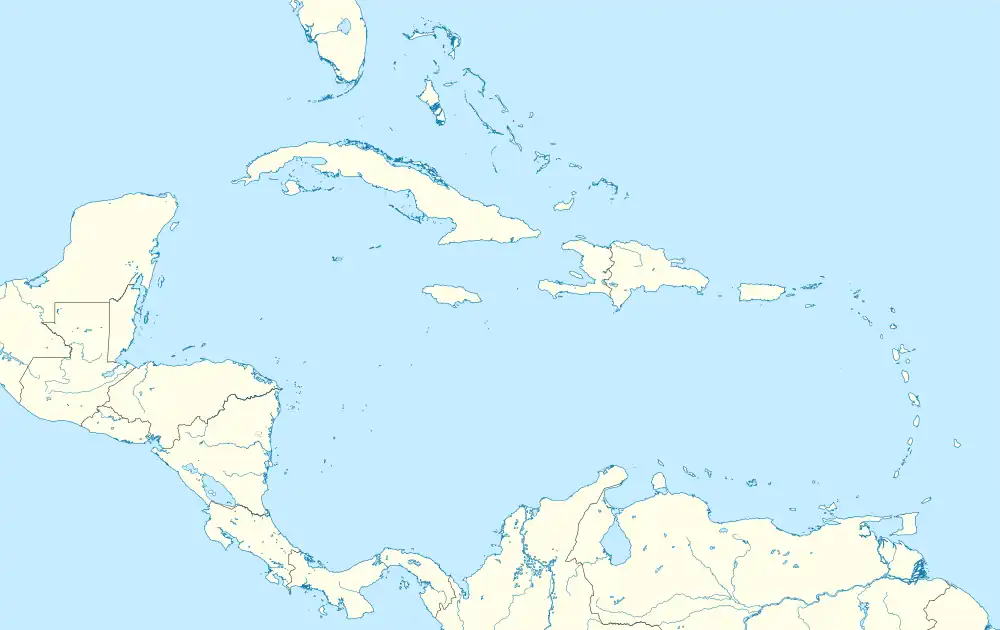 Grand Turk | |
| Geography | |
|---|---|
| Location | Atlantic Ocean |
| Coordinates | 21°28′20″N 71°08′20″W |
| Archipelago | Lucayan Archipelago |
| Area | 18 km2 (6.9 sq mi) |
| Administration | |
United Kingdom | |
| British Overseas Territory | Turks and Caicos Islands |
| Largest settlement | Cockburn Town |
| Monarch | Charles III |
| Demographics | |
| Population | 4,831 (2012)[1] |
| Pop. density | 206.67/km2 (535.27/sq mi) |
| Additional information | |
| Time zone | |
| • Summer (DST) | |
| ISO code | TC |
The name comes from a species of cactus on the island, the Turk's cap cactus (Melocactus intortus), which has a distinctive cap, reminiscent of an Ottoman fez.
History
The Lucayan people were the indigenous people of the island, who called it Abawana, meaning "the First Small Land". The Spanish later called it Amuana.
Grand Turk was first colonised in 1681 by Bermudians, who set up the salt industry in the islands.[3] In 1766 it became the capital of the country. For some time, at least until the early 19th century, Grand Turk was often referred to as Grand Cay,[4] not to be confused with either Grand Cay in the Bahamas or Grand Cayman.
Grand Turk Lighthouse
Grand Turk Lighthouse was erected in 1852 near northern end of the island. The 60 ft (18 m) lighthouse was designed by Alexander Gordon and built by Chance Brothers in England. It was shipped in pieces and assembled on Grand Turk.[5][6]
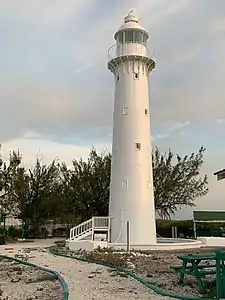 Grand Turk's lighthouse, on the northeastern tip of the island
Grand Turk's lighthouse, on the northeastern tip of the island
Columbus landfall theory
Grand Turk has been put forward as the possible landfall island of Christopher Columbus during his first voyage to the New World in 1492.[7][8] San Salvador Island or Samana Cay in the Bahamas is traditionally identified with Guanahani, the site of Columbus' first landfall, but some believe that studies of Columbus' journals show that his descriptions of Guanahani much more closely fit Grand Turk than they do other candidates.[9] Magnetic variations that caused misreadings in Columbus' compasses demonstrate that several of the recorded moorings using a rope-secured anchor to a clear sandy bottom would not have been possible had Columbus sailed from the islands of the Bahamas.[10] In addition, the latitudes recorded in Columbus' diary place the landfall island at 90 nautical miles (100 mi; 170 km) from Hispaniola, too close for the Bahamas, but almost exactly the distance from Grand Turk.[10]
On the contrary, historian Gregory McIntosh has concluded that Grand Turk was not Guanahani but Babueca, an island separately discovered by Martín Alonso Pinzón in November - December 1492.[11]
U.S. Military presence
Naval Facility Grand Turk
A U.S. Naval Facility (NAVFAC), the name given for a shore terminus of an offshore surveillance array of the Sound Surveillance System (SOSUS), was established on Grand Turk in 1954 as one of three additional Atlantic systems installed that year during the first phase of SOSUS installation. The facility was commissioned 23 October 1954 and was active until decommissioned 31 March 1980. The actual undersea surveillance mission of the system and shore facility remained classified through decommissioning.[12][13] The NAVFAC was located (21°30′43.6″N 71°07′57.7″W) near the Grand Turk Lighthouse.
Missile Impact Location System
Grand Turk, located about 700 nmi (810 mi; 1,300 km) from Cape Canaveral, became the first down range tracking facility of the U.S. Air Force's Eastern Range to have a Missile Impact Location System (MILS) target array to detect the splash down location of test missile nose cones. The next target arrays down range were located at 1,300 nmi (1,500 mi; 2,400 km) at Antigua and at 4,400 nmi (5,100 mi; 8,100 km) at Ascension Island. In addition to the precise target array the facility was the terminus of one of the Broad Ocean Area (BOA) MILS that could give good location data over large ocean areas.[14]
Other installations and events
From 1957 to 1959 USN Mobile Construction Battalion 7 constructed a LORAN Station on the island.[15]
In 1962, John Glenn's Friendship 7 Mercury spacecraft landed in the vicinity of Grand Turk Island off the southeast shoreline. A replica of the Friendship 7 is on display in Grand Turk at the entrance to the Grand Turk Island airport.[16]
In 1966 at least five Arcas (All-Purpose Rocket for Collecting Atmospheric Soundings) sounding rockets were launched from Grand Turk Island by the USA.[17]
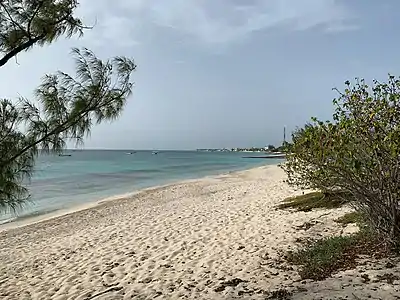 Looking north along Cockburn Town Beach, near the south end of Duke St.
Looking north along Cockburn Town Beach, near the south end of Duke St.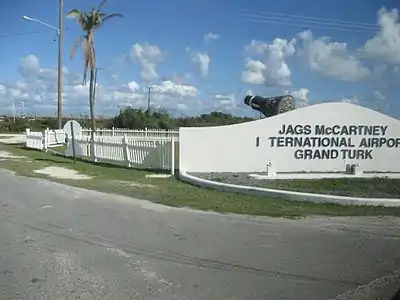 Replica of the Friendship 7
Replica of the Friendship 7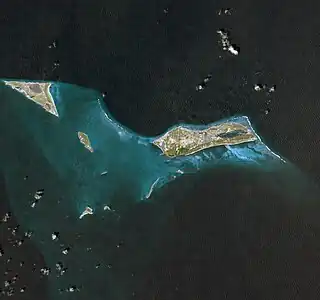 Grand Turk Island as seen from space in 2009
Grand Turk Island as seen from space in 2009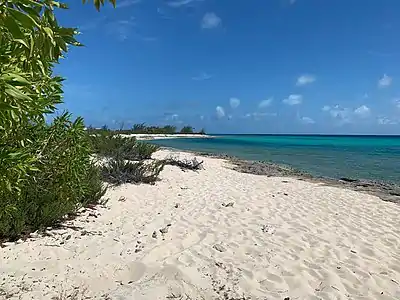 Looking east at Columbus Landfall Beach, near JAGS McCartney International Airport
Looking east at Columbus Landfall Beach, near JAGS McCartney International Airport
See also
References
- "Population 2012 census". Government of Turks and Caicos. Retrieved 15 May 2021.
- Ferguson, James A.; Bounds, John H. "Turks and Caicos Islands". Encyclopædia Britannica. Archived from the original on 11 October 2008. Retrieved 2022-03-05.
- About Grand Turk - Visit Turks and Caicos Islands
- Rellie, Annalisa; Hayne, Tricia (2008). Turks and Caicos. Bradt Travel Guides. p. 155. ISBN 978-1-84162-268-2.
- Rowlett, Russ. "Lighthouses of the Turks and Caicos Islands". The Lighthouse Directory. University of North Carolina at Chapel Hill. Retrieved 27 Oct 2017.
- "TC Tourism". Retrieved 27 Oct 2017.
- Dyson, John. Columbus: For Gold, God, and Glory, (Toronto, Ontario, Canada: Madison Press Books, 1991), p. 164-165. ISBN 0-340-48794-1
- Power, Robert H. (1983). "The Discovery of Columbus's Island Passage to Cuba, October 12–27, 1492". Terrae Incognitae. 15: 151–172.
- "Columbus Monuments Pages - Columbus' First Landfall".
- Handy, Gemma (7 August 2016). "Following Columbus: The team trying to rewrite the explorer's route". BBC.com. BBC. Retrieved 7 August 2016.
- McIntosh, Gregory (1992). "Martín Alonso Pinzón's Discovery of Babueca and the Identity of Guanahani". Terrae Incognitae (24): 79–100. Retrieved 20 August 2016.
- "Integrated Undersea Surveillance System (IUSS) History 1950 - 2010". IUSS/CAESAR Alumni Association. Retrieved 13 September 2020.
- Commander Undersea Surveillance. "Naval Facility Grand Turk — October 1954 - March 1980". U.S. Navy. Retrieved 13 September 2020.
- Cone, Bruce E. (1 July 1976). The United States Air Force Eastern Test Range — Range Instrumentation Handbook (PDF). Patrick Air Force Base, Florida: Eastern Test Range, Directorate of Range Operations. pp. 1–1, 2-73–2-74. Archived (PDF) from the original on February 27, 2021. Retrieved 13 September 2020.
- MCB 7 Cruise book 1957-59, Seabee Museum, Port Hueneme, Ca
- "History of the Turks and Caicos Islands". Visit Turks & Caicos Islands. Retrieved 20 February 2015.
- Frasketi Jr., Joseph J. "The Grand Turk Island Connection with". Joe Frasketi's Space and other Topical Covers. Retrieved 20 February 2015.
External links
- Grand Turk - Visit Turks and Caicos Islands
- Grandturk.tc
- Grand Turk Chamber of Commerce
 Grand Turk travel guide from Wikivoyage
Grand Turk travel guide from Wikivoyage